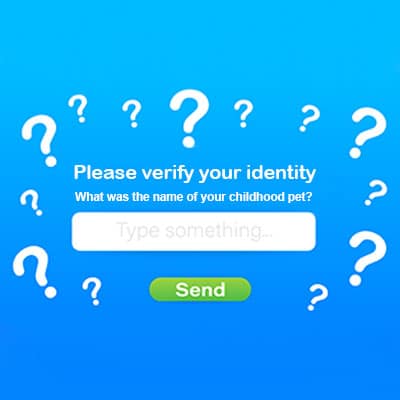What was the name of your first pet? What is your favorite TV show? What was your mother’s maiden name? Here’s the real question: what do you think questions like these are actually going to do to help secure your important accounts?
What is Password Hygiene?The practice of securing your accounts with well constructed, unique passwords is called password hygiene. Having good password hygiene means that you will avoid the use of authentication methods that can be easily compromised. Below is a list of unhygienic password creation practices: The use of personal details, like your name or birthday The names of friends, family, or pets The use of commonly used words (like “password” or a favorite sports team) Using simple keyboard combinations (like “12345” or “qwerty”) The us of repeated login credentials (like username: Cornoa2020, password: Corona2020) Using short passwords If you are now worried that your passwords are easily guessable, don’t fret. Here, we’re going to outline some strategies you should stop using immediately as they no longer provide the value they once did to keep your accounts secure. Alphanumeric Switching – This is just a fancy euphemism for turning some of your letters in your password to numbers. If you’ve been making passwords for any length of time, you’ve probably taken part in this practice. The problem is that it is ineffective against the modern hacking software designed to crack passwords. Length Requirements – For much of the past decade, if you needed to make an account password, it had to be a certain number of characters. According to the Nation Institute for Standards and Technology (NIST) longer passwords are actually hurting your chances of keeping an account secure as they are harder to remember. Banning Cut and Paste – This practice was only done for a few years, but industry leaders now find it to be a pointless security gimmick. It eliminates the availability for users to use a password manager, which is one of the best practices for password-led security in 2020. Password Hints – If you set up online banking anytime in the past decade you were asked a series of questions that would allow you to gain access to your credentials. This isn’t as effective nowadays as more information about users are available online. Too Frequent Password Changes – You’ll still want to make users change their password, but having them do it so frequently that they forget their credentials can be a major problem for a business. Best Practices of Password Hygiene We have come to recommend that users create passphrases made up of at least three words that don’t have any correlation. In this method, if you want to use replacement characters (like the aforementioned alphanumeric switching), it has value. For example if you were to make the At SRS Networks, we recommend that users use a passphrase made up of at least three words that don’t have anything to do with one another. We also believe that using replacement characters can have value in this method. For example, a passphrase of “japanlovessushi” is not in itself secure, because it’s a common phrase, but a passphrase of “japanlovesenchiladas” is better. Use substitution methods to add security from there. If you would like more information about password hygiene or securing your accounts and identity online, call the IT professionals at SRS Networks today at (831) 758-3636.
This can create some difficulties. How often have you found yourself locked out of one of your accounts because you accidentally put in the password for another one? Or one that you had used for that account in the past? These kinds of issues can be insanely irritating to deal with, which is why password management systems have become so popular among businesses. Here, we’ll review the three primary reasons that you should consider password management. Less to Remember A 2007 study states that, on average, a computer user typically had about eight password-protected online accounts. Considering all of the services and platforms that have been developed and become popular in the last decade, it isn’t hard to imagine that this “eight” has almost assuredly swelled considerably. This means that the pressure that comes from remembering a sufficiently complicated password for each account has similarly swelled. While the human memory can be trained to astounding limits, that requires some pretty intense training… are you suggesting that you’re willing to invest in this training for each one of your employees? Unfortunately, most businesses can’t realistically make this commitment. That’s okay, because a password manager accomplishes effectively the same thing, while giving you control over your own resources and assets. All a user needs to remember is a single master password, and they will be able to access all of the passwords they need to do their job. Security is Easier to Maintain So far we’ve reviewed that it is important to use a variety of passwords that corresponds to the variety of accounts you have, but we haven’t really touched on why. Doing so is pretty simple… just put it in the scope of the private user. Would you rather have a credit card stolen, or have all of your credit cards, bank accounts, medical records, property holdings, investments, and social media accounts stolen? While neither option is ideal, the latter one is clearly worse, and is exactly the kind of scenario that comes from recycling passwords. A password manager protects you from the temptation of recycling passwords, as well as the temptation to make them easy to guess. As a result, your overall password strategy remains secure, the potential for escalation being significantly reduced. Improved Management There will almost assuredly be varying needs in your business, as far as access to documents and resources is concerned. However, if there is a particular account that needs to remain secure, while still being accessible to your staff, a password management system can be extremely helpful. Via the password manager, you can manage your users’ credentials. Controlled by the responsibilities of each user as per their role, you can prevent your users from even seeing the credentials while they are putting them in, boosting your security even farther. Want help improving your security, either through a password management system or some other means? Reach out to SRS Networks at (831) 758-3636 to start a conversation.
Your identity has quite a lot of value, especially in the wrong hands. Security firm ZoneAlarm put together some numbers in 2011 concerning identity fraud, and it even shocked us. Let’s talk about a few of these statistics and what it means.




